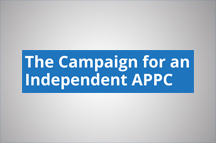Public affairs businesses, jobs and the reputation of the sector as a whole are far better protected with an independent APPC. This was the majority view of consultants at the recent discussion and vote which my agency held on the issue. I was surprised by the level of loyalty shown by even the newest entrants to our industry, and they are not alone in backing the case for an independent APPC. So why have agencies large and small united in their opposition to the merger?
1. Watering down
The APPC is a self-regulatory organisation, set up and led by public affairs practitioners to regulate the conduct of public affairs. The PRCA is a trade association, set up to promote the public relations sector. The two are very different and by allowing ourselves to become only a small sub-group of a much larger organisation representing public relations, we dilute our own impact and contrary to having “a single voice”, we have no effective voice.
2. Veto
The APPC already represents the “Gold Standard” benchmark that others look to emulate. Our most important duty is to continue to be the guardians of our Code of Conduct. Currently the APPC Management Committee is able to debate in detail proposed amendments to the Code and vote on changes to strengthen it. There are serious concerns that after a merger, the APPC would have only one representative on the PRCA’s Board, whose interests are far broader than public affairs and who would have the power to veto any proposals to strengthen the Code in future.
3. There is another way
Why are we trying to fix something that isn’t broken? Whilst we can probably all agree there is room for improvement, the APPC Management Committee has already received a proposal for an even better APPC. This proposal was developed following an in-depth review which found overwhelming support for the APPC and a clear desire to build on the strong foundations established at its formation in 1994. This proposal was warmly welcomed by the Management Committee and outlined plans to enhance the value to members in a number of areas:
- A more substantial training programme;
- Activity outside London and training in Scotland, Wales and NI;
- A revenue generating annual event for all members;
- A programme educating politicians and journalists about the Code and ethical lobbying;
- Building the membership base and ensuring more people are covered by the “Gold Standard” Code.
Whilst these things would need to be discussed and voted on by the APPC membership and Management Committee, it is important to note that this is not a vote between a merger and the APPC as it currently is. This is a vote between a merger and an even better APPC. There is no going back from a merger and I for one would love to see what an enhanced APPC can do before we make any irreversible decisions that future generations of public affairs practitioners may regret.
Emma Petela
APPC Deputy Chair
Director, GK Strategy














